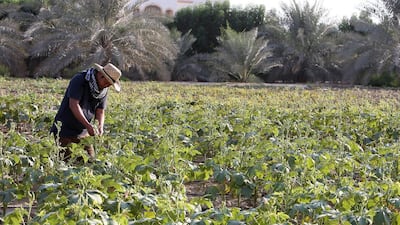ABU DHABI // Farming will be more environmentally friendly, efficient and profitable because of the country’s first agricultural policy, which was recently submitted to the Ministry of Environment and Water.
Formulated by the United Nations’ Food and Agriculture Organisation (FAO), along with agricultural organisations in the UAE, the 126-page-document includes policies on improving the country’s agro-food system.
“It will be the essential document for everything that the UAE will implement in the field of agriculture towards the UAE vision 2021 and 2030,” said Mehdi Drissi, FAO representative in the UAE and FAO subregional coordinator for the GCC and Yemen.
“The policy has implications on subsidies given to farms and farmers and will have to look at the national policy and do what is explicitly there.”
Mr Drissi expected the policy to receive the approval of Dr Rashid bin Fahad, Minister of Environment and Water, before the year’s end, after which it would be implemented immediately.
“It is necessary for all countries to have such a policy because it brings benefits,” he said. “The UAE are champions of sustainable development and the strategy focuses on that. It strongly takes into account what was decided in New York at the previous general assembly with the 17 new sustainable development goals and 169 objectives. The policy is based on that.”
The document, he said, outlined the next 15 years of agriculture in the UAE.
“The former strategy, it had lacked a lot of things,” he said. “This is an essential document.”
While the UAE is not considered an agricultural country, with about 90 per cent of its food imported, it has tried to grow as many crops as possible, especially during the cooler winter months, in greenhouses.
“The magnitude of the challenges, when it comes to sustainability in food production and water usage, facing not only the UAE but also other water-stressed parts of the world and the entire human population in one way or another, is significant,” said Nicholas Lodge, managing partner at Clarity, an Abu Dhabi-based agricultural consultancy.
“Work such as that done by the FAO, together with the UAE Government, which aims to apply a long-term and holistic approach, recognising economic and environmental issues, along with social and human aspects, is certainly positive.
“Regulatory-driven changes in behaviour are probably necessary as much as economic and market-driven changes.”
To encourage changes in behaviour and raise awareness among youth on sustainable consumption and production, Mr Drissi conducted a seminar at Zayed University this week.
“It was an exchange between the UN and students about food and water. It was to talk to them about employment opportunities for them with the UN and, more specifically, with the FAO in the UAE,” he said.
“We would like to hire Emiratis. In the UAE, in particular, there is a lack of presence of Emiratis in the UN offices. Since I arrived here six months ago it has become one of my priorities.”
He said that many locals had expressed interest. “That was really satisfying to me to see how interested they were. I’d like to hire at least six to eight Emiratis for next year at different levels. They have extensive knowledge of food and agriculture, food security, safety and they know a lot about trade, food waste and water scarcity. I was pleasantly surprised.”
Universities are also encouraging locals to get involved.
Prof Fatme Al Anouti of the College of Sustainability and Human Sciences at Zayed University, said young Emiratis were increasingly becoming interested in the topic.
“We had the undergraduate research forum last week and one of the projects was about food security in the UAE.
“It’s important for them to be aware of it because we’re running out of resources. We need to secure food and they need to come up with strategies to make sure there is enough food and resources in the future.”
cmalek@thenational.ae

